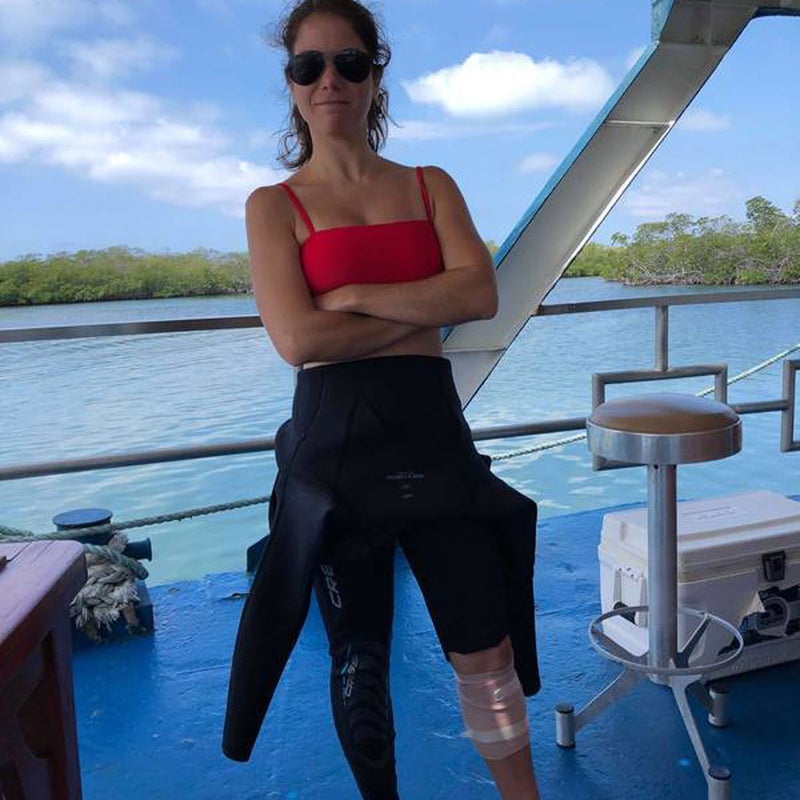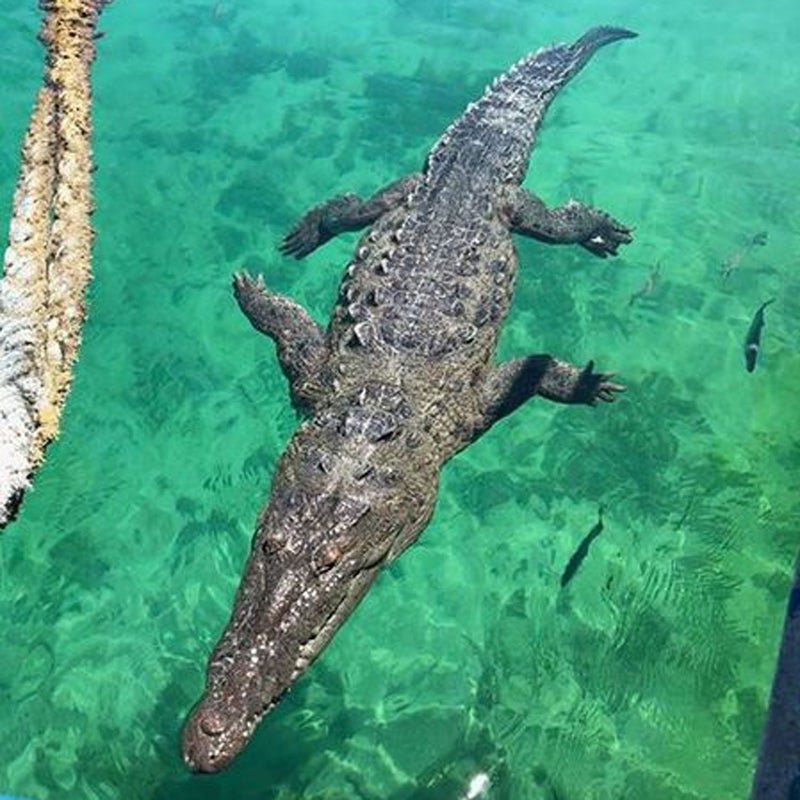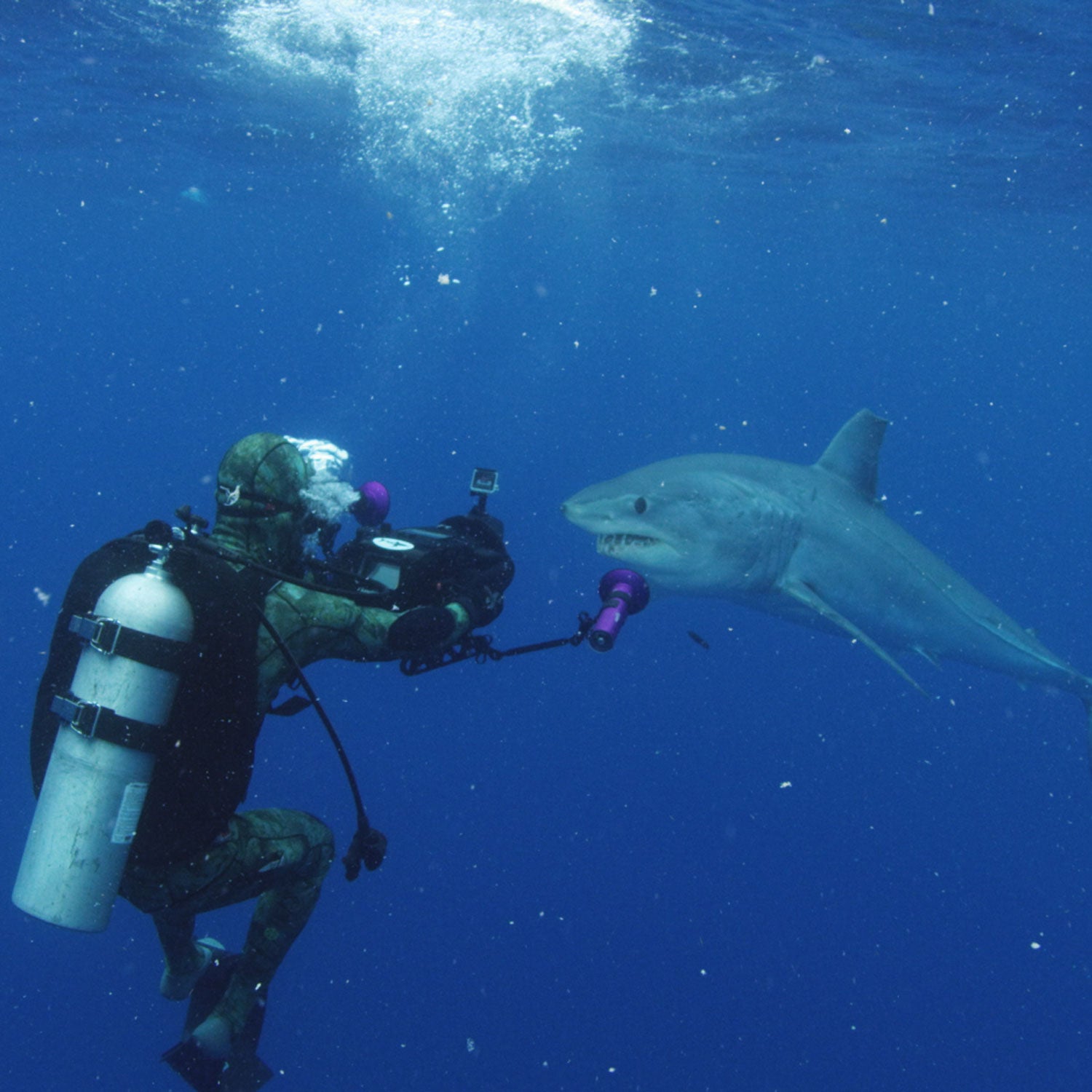As part of her work as a shark scientist and wildlife educator, Melissa Cristina Márquez looks at how predators are portrayed in the media—for example, when they bite someone. While filming Cuba's Secret Shark Lair, which premiered on Discovery Channel’s Shark Week on July 23, she became a firsthand witness to that research when a crocodile clamped down on her leg. She spoke to Outside about her work and experience on set.

OUTSIDE: Can you tell us about your background as a biologist and what sharks you study?
MÁRQUEZ: I've been studying sharks since 2011, when I entered undergraduate school at the New College of Florida in Sarasota. We had off in January to do what we call ISP—independent study projects. The first one that I did was in the Bimini Shark Lab in the Bahamas. If you are a shark nerd, that’s where you go. And that hooked me. I said, “Yep, this is exactly what I want to do.” The next ISP I went to was in South Africa, and I started studying great white sharks. That led to my senior thesis, which focused on tracking great whites; I’m always interested in tracking why an animal is where it is and what it’s doing. That’s essentially my tagline. People will say to me, “What are you, like a shark PR manager?” And I say, “Yeah, I can deal with that description.”
I also look at how sharks and their relatives, collectively called chondrichthyans, are portrayed in the media. I look at the language the media outlet is using and how it varies between animals. I look at how people form attitudes towards animals and how those vary between land predators and marine predators. I’m currently between my master’s and my Ph.D., but I’m keeping myself busy with that media research on the side and also full-time running my program, the Fins United Initiative. We highlight the sharks that you don't normally see on Shark Week, and the scientists and people who work with these animals that you normally don't care about.
What did you think when the Shark Week production company approached you? Did you have any hesitations?
I screamed a little bit when I got the email. I thought, “Is this actual life?” Because Shark Week is what got me interested in sharks, when I moved from Mexico to the States. We were moving during the summer, and my parents didn't want me rummaging around the boxes, so we put on the TV and I was flipping through all the channels. That's when I came across Shark Week. And I was just like, “What…. is this?” I was hooked. Getting the chance to be on the show was really fun.
I had a lot of questions about what the premise of the show was, and they answered to the ability that I felt comfortable participating. It was an amazing group of people who were really there to learn more about the sharks. I was thrilled to be a part of it.
We heard that you were bitten by a crocodile during filming. How did that happen?
We were in an archipelago off the southern coast of Cuba known as Jardines de la Reina. We were diving at night, and my full face mask started acting up during the dive, so I could only communicate with my hands. So I stuck by one of our dive guides, and he motioned, “Hey, it’s time to go up,” and I gave him the OK sign. He starts going up, he crosses in front of me, and I don’t want his fins to hit me in the face so I wait two or three seconds. In those two or three seconds I suddenly felt really hard pressure on my leg. I’m like, “What in the world,” and as I’m thinking that, I start getting dragged backwards, into the mangroves. I really quickly put two and two together that it was a crocodile that had me, because we had just been diving with one a few minutes ago. While that was happening, I started clawing at the sand with my hands to see if I could find a rock or a twig or something, to either hold onto or, worst comes to worst, starting hitting the dang thing with it and see if I could pry my leg out. During that time, I’m also trying to keep my leg really still so it doesn't bite down harder and rip a chunk of my leg out, or worse, start rolling. If it starts rolling that’s it, my leg's gone.
But there weren't any rocks because we were in the mangroves. As I'm wracking my brain trying to figure out what next to do, it lets me go. That’s it. No fight, nothing. I think it realized quickly, “This isn't something I want to eat,” and, I don't want to say it spat me out, but it opened its jaws and let me go.
Once back on the boat, I got looked at by the medical team. I have a nice scar: an imprint of a crocodile jaw on the inside of my left leg, and two puncture wounds on the outside of my leg. This happened a few months ago, and the wounds are finally closing.
It was definitely scary. It puts me in an interesting position because I'm now a “survivor.” But I'm also a person who studies predators. When I got picked up out of the water, the first thing that came out of my mouth was, “It was an exploratory bite, it was an exploratory bite!” Crocodiles, specifically saltwater crocodiles, have extremely powerful jaws. This was an American crocodile, but the fact that I was able to literally walk away—I was limping because it was painful—and not a single part of my leg was torn off or anything like that, was a miracle. Especially because this crocodile was big, about ten feet.

I always wondered with Shark Week what would happen if there was an emergency during filming. They really put my safety and health above everything else, even while filming the show, which was really nice to know. They really took care of me. I cannot sing their praises enough—of both the Shark Week team and the crew in Cuba.
Were you worried about how the producers would edit the show?
I had a really good conversation with the producers and the rest of the team, and all of us were on the same page that this is about science and research. Any kind of network now is adding a little bit of drama and clickbait. With my croc bite, I was worried it was going to get super dramatized. There were two things we all made sure were going to make it in the end cut: that we had a medical team that OK’d me to stay afterward, but also that it wasn't the crocodile's fault. We were all very, very adamant about making that a point, that it was literally no one’s fault. We followed all the safety procedures, and when you are working with predators things happen. It could have happened to anyone, it just happened to me.
I was telling a few friends what happened, and a few of the reactions were, “Well, did you kill it?” I said “No, we didn't kill it!” I think it's going to be a very teachable moment.
This interview has been edited for clarity and length.

